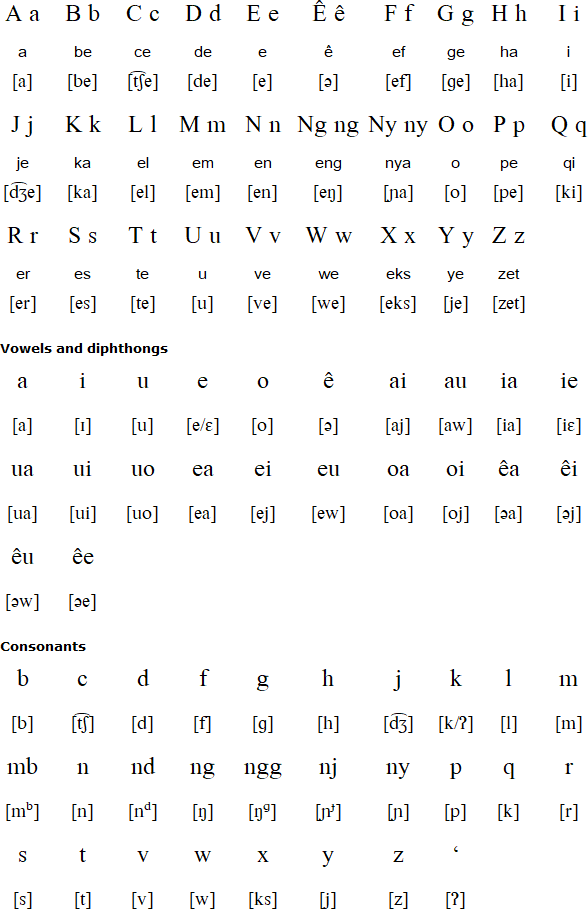Rejang is a member of the Bornean branch of the Malayo-Polynesian language family. It is spoken by the Rejang people mainly in Bengkulu and South Sumatra provinces in Sumatra in Indonesia. In Bengkulu Province it is spoken in the regencies of Central Bengkulu, Kepahiang, Lebong, North Bengkulu and Rejang Lebong. In South Sumatra Province it is spoken in North Musi Rawas Regency. There are also Rejang speakers in neighbouring provinces, and in Jakarta.
According to the 2000 census, there are about 350,000 speakers of Rejang, which is also known as Djang, Jang or Redjang. There are five major dialects of Rejang: Lebong, Musi, Kebanagung, Pesisir and Rawas. They differ in vocabulary and pronunciation, and are mostly mutually intelligible.
Rejang contains many loanwords from neighboring Malayic languages, and continues to borrow many new words from various languages, especially Indonesian and English. Some Arabic and Sanskrit words have been incorporated into Rejang through Malayic languages, and are now treated as native words. Rejang is not closely related to any other languages in Sumatra.
Rejang was first written with a script known as Aksaro Riking or Kaganga. It is not known when this script was first used, but the earlist known document in Rejang in this script dates from the mid-18th century.
Literacy in Rejang declined after colonisation of Sumatra by the British and Dutch from the early 17th century. Since the 1960s Rejang has been written with a version of the Latin alphabet, and appears in some newspapers and online. However, there is currently no standard way of writing Rejang.

Download alphabet charts for Rejang (Excel)
Kutê tun laher mêrdiko, tmu'an hok-hok gi srai. Kutênê nagiakba akêa peker ngen atêi, kêrno o kêloknê bêkuatba do ngen luyên nêak lêm asai sêpasuak.
Hear a recording of this text by Niomiya Kazumi
Kêtê tun laher mêrdiko, tmu'an hak-hak gi srêi. Kêtênê nageakba aka peker ngen atie, kêrno o kêlaknê bêkuatba do ngên lêyên nak lêm asêi sêpasoak.
Kêhtê tun laher mêrdiko, tmu'an hak-hak gi srêi. Kêhtênê nageahba aka peker ngen atêe, kêrno ho kêlaknê bêkuatba do ngen lêyên nak lêm asêi sêpasoah.
Source: https://id.wikipedia.org/wiki/Bahasa_Rejang#Contoh_teks
All human beings are born free and equal in dignity and rights. They are endowed with reason and conscience and should act towards one another in a spirit of brotherhood.
(Article 1 of the Universal Declaration of Human Rights)
Bahwa sesungguhnya kemerdekaan itu ialah hak segala bangsa, dan oleh sebab itu maka penjajahan diatas dunia harus dihapuskan. Karena tidak sesuai dengan perikemanusiaan dan perikeadilan.
Whereas independence is a genuine right of all nations and any form of alien occupation should thus be erased from the earth as not in conformity with humanity and justice.
(1st paragraph of the preamble of 1945 Constitution of the Republic of Indonesia).
Information and corrections provided by T. R. Carlton of the University of Alberta, Michael Peter Füstumum, Fikri Anurudha and Ridwan Maulana.
Information about Rejang | Rejang (Kaganga) script | Numbers
Information about Rejang
http://en.wikipedia.org/wiki/Rejang_language
https://www.ethnologue.com/language/rej
Belait, Bonggi, Central Dusun, Coastal Kadazan, Idaʼan, Kadazandusun, Kelabit, Lun Bawang, Melanau, Rejang, Tombonuwo
Page last modified: 09.06.24
[top]
You can support this site by Buying Me A Coffee, and if you like what you see on this page, you can use the buttons below to share it with people you know.

If you like this site and find it useful, you can support it by making a donation via PayPal or Patreon, or by contributing in other ways. Omniglot is how I make my living.
Note: all links on this site to Amazon.com, Amazon.co.uk
and Amazon.fr
are affiliate links. This means I earn a commission if you click on any of them and buy something. So by clicking on these links you can help to support this site.
[top]